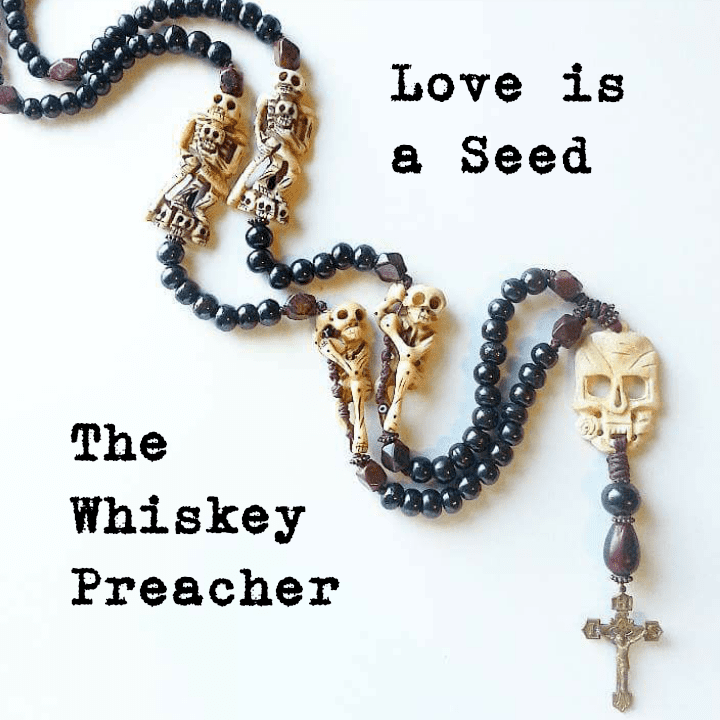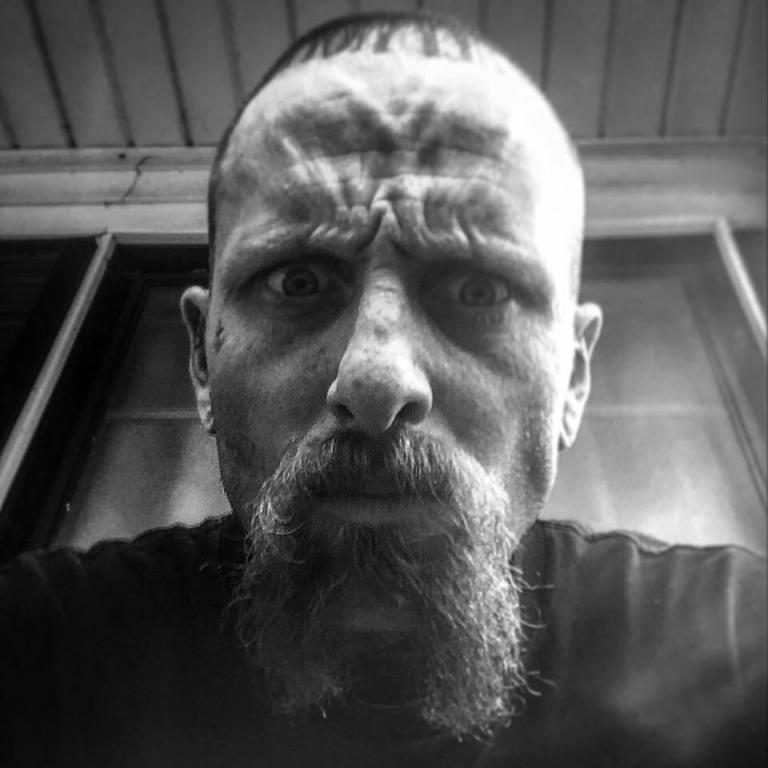I was asked to write this article over a year ago for my good friend Neil Christopher over at evolitionist.com and I wanted to re-post it here…in all honesty because I liked the article! lol So here it is!
The Other Sheep
I love stories. I love the stories of the people I come in contact with. At times I feel that I am a collector of stories. As I look back on my life growing up, I think I learned the value of story from my dad… He was always telling stories – whether folks were listening or not. I loved that about him. If you ever had the privilege to digest one of Pop’s stories, you would realize that his storytelling had a recipe – a recipe of part bullshit, part truth, layered in love, and garnished with genuine southern charm. I miss his storytelling – as annoying as it was at times – I still miss his stories.
You might think the biggest thing that I learned from Pop’s colorful storytelling was patience. But the biggest thing that I learned from Pop’s storytelling was the art of listening. Hear me, I do not I think I have mastered the art of listening by any stretch. If you ever catch me at any sort of business meeting or at a trendy jazz concert that Stephanie (my wife) has dragged me too, trust me, I tune out like a geriatric patient with a hearing aid problem. But when it comes to listening to people’s stories, I am a sucker for them – and I give Pop credit for that. He is the one who taught me to love people’s stories – even when those stories are sometimes not that interesting (at least not to anyone but that one person telling the story). He taught me to love people’s stories because it’s their story – stories are that are unique to them and no other.
Interacting within and through the narrative of the Hebrew/Christian scriptures, I’ve found it’s like anyone else’s story – unique and important to listen to. I will also be the first one to confess that many of us who have claimed ownership of the Hebrew/Christian narrative have had deafened ears to hear the story itself. Instead of listening, we have opted to ignore the story it’s telling or act like we have paid attention with the unfaithful amen or the obligatory nod. Hear me: I speak from experience not judgment. I have totally missed the mark on this and still do from time to time even now – like I said before: I don’t feel like I have mastered the art of listening.
As a recovering fundamentalist Christian, I used to have the Hebrew/Christian scriptures as the unhealthy center of my theology (i.e. scriptures were my god – I held scriptures as the center – not God at the center-point). Because of this I’ve chosen to now engage the Hebrew/Christian scriptures through the voicebox, the larynx, of community and, for me specifically, I give the scriptures their voice through my faith community, The Eucatastrophe, here in Fort Worth, TX.
I think that’s why, for me at least, I have found listening to the narrative of the Hebrew/Christian scriptures in a communal context allows me to hear the voices speaking within text without a muted or muffled undertow. I am not saying that in a communal context that the narrative is not, at times, deluded either – but that is where I believe we have to invite the community of God – that we call the Trinity – into our conversation to illuminate the parts we do not hear.
I find myself often interacting with the Hebrew/Christian scriptures as the retelling a part of the larger unique story that I am choosing to live out my meta-narrative in and through. We use the intentional language at The Euc (what we call The Eucatastrophe for short) that we are a part of the larger narrative of the Creator. However, we do not have the desire to be stuck in what has already been written, but be faithful to the ongoing narrative by co-creating with our Triune Creator. And for us to be able to do that, we must healthily engage the overall narrative that is written about in the Hebrew/Christian scriptures which points us back to the Triune Creator.
Here is prime example of what I mean: some weeks back Stephanie was teaching at The Euc from the lectionary passage found in the gospel of John chapter 10 (I encourage you to read the entire chapter to be able to wrap some context around the dialogue Jesus is having with the crowd he is addressing). As Stephanie lead our teaching/discussion time during this particular Sunday night gathering at The Euc, she taught through the discussion portion of the evening from the 10th chapter of John – the chapter that talks about the Good Shepherd – and verse 16 in particular stood out to me. This is what was read (via The Message translation): “You need to know that I have other sheep in addition to those in this pen. I need to gather and bring them, too. They’ll also recognize my voice. Then it will be one flock, one Shepherd.” Wait, what?! There are other sheep?
At this junction within this article I am sure that you, the reader will being expecting me, the writer to indulge/divulge in the fact that I had this epiphany illuminated from the text to me because of the communal dialogue that had with it and though that expectation put upon this article would be valid. However, I am drawn back to the question that popped into my mind during this initial discussion: WHAT THE FUCK? THERE ARE OTHER SHEEP?
The vinyl was scratched, the cd skipped, the ipod flashed the neon orange dead battery icon, the party had come to a dead halt… and the crickets? Well, even the crickets were silent. All I could hear was this question echoing throughout my soul: there are other sheep?
For a long time now, I have been aware that the Creator was active within many different meta-narratives – and has been since the time of creation. But I had never heard with my ears anything so blatant before from the Hebrew/Christian texts until now. I am not here to do an exegetical work on the passage found in the tenth chapter of John. I am not in seminary. Thus, I don’t write on things I don’t want to write about anymore – that’s probably why I write articles for places like evolition and my website, whiskeypreacher.com, and probably why I’m not working on a PhD in something I don’t give a shit about. However, I do give a shit about the other sheep. Now some would say that I am the other sheep – because I no longer dwell within the fundamentalist pen I used to dwell. And even if I am still in the same sheep pen I was before, does that I mean I no longer know the Shepherd’s voice?
I realize that the metaphor of being called a sheep brings a lot baggage to the table for many people – concepts that dub us a dumb creation that is called into slavery from a master that hates us. I also know that many of us have never seen a sheep live in person – let alone know what its like to take care of one. Hell, my last name is Shepherd and I’ve never owned a sheep. The metaphor may not translate well contextually to the 21st century (unless you are sheep farmer then, of course, it’s quite relevant to you).
What does contextually translate over is the fact that Jesus is talking in an inclusive vernacular – this sheep pen does not have all the sheep – yet there is one Shepherd and they all know His voice. The Christian church may act like we posses the corner market on knowing who does & who doesn’t know the Shepherd’s voice. Many try to take head counts of who is in the sheep pen and who isn’t – and treat Jesus like a cosmic bouncer – the one that who gives the nod of who to acknowledge, as well as who we think should be let in and who we shouldn’t let in. What many of us have forgotten is that Jesus is not a cosmic bouncer but the gatekeeper of all of the pens (i.e. it’s Him – not us – that controls the gate).
Before I go on I want to make this disclaimer: I know that many of you who are reading this have found God through a different meta-narrative. I am not trying to discount that. However, because I find myself within the Hebrew/Christian meta-narrative, I am writing from my experience within that narrative. With that said, I’ve found my path to God through the way of Jesus. He is my Shepherd and a part of the community of God that many of us call the Trinity. I believe birthed out of that community of God, we as the creation were made – and not only made, but were made really good.
Now back to the question: there are other sheep? I know that this may be an arrogant question because it presumes that God has only been active within the Hebrew/Christian narrative and I agree with you in that critique…it is an arrogant (and even ignorant question to ask). However within the narrative of my story, I feel that for us to come into a healthy rhythm with the Creator, we must ask the question: there are other sheep?
If we look back through the Hebrew/Christian scriptures – stories such as the Good Samaritan (a race the Jews considered Godless because they were “half-breeds”) and the story of the Good Shepherd that recently brought me to my latest “holy shit” moment, we find Jesus suggesting within his teachings that the community of God is active within other cultures and even other faith structures. If we look even farther, into one of the oldest stories in the Hebrew/Christian text, we find the book of Job – the story that introduces the character of Satan to the larger narrative is not an Israelite story; it’s an Edomite story – suggesting that God is well and active outside of the chosen people. And that the chosen people recognized it and included it in the cannon of Hebrew scriptures. The inclusion of others, outsiders, is all over the narratives. Even the account of the Israelite exodus from Egypt includes other nations… showing YHWH is present an active outside Israel. I know that is not a popular statement to say, however, like I proposed before: we must ask the question: there are other sheep?
The Triune Creator, who I choose to believe created me and the rest of creation, cannot and should not be limited to my finite definition of where and with whom He/She should be involved. We are told in the epistles of the New Testament that the followers of Jesus will be known by our love. Jesus Himself declares in the gospels that all the laws of the prophets (which was equivalent of the Jews’ moral constitution) are hung on this: love the Creator with everything we are and to love our neighbors as ourselves. As I continue to listen and re-listen to the narrative, I find nothing within these mandates declaring that it is my job to figure out who are the other sheep; my mandate is to acknowledge the fact that there are other sheep and they too were made in the image of God. These other sheep, they too know the Shepherd’s voice and love the Creator even if they don’t call Him/Her by the name I do. I am called to love. Period. If Jesus is supposed to be my example and challenges me to love Him and the rest of His community with everything I am and to love my neighbor as myself, then that is what we need to do. We are all sheep and we all know the Shepherd’s voice, but will we listen to the other story the Creator calls us into?











